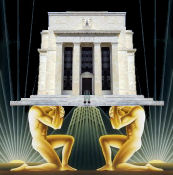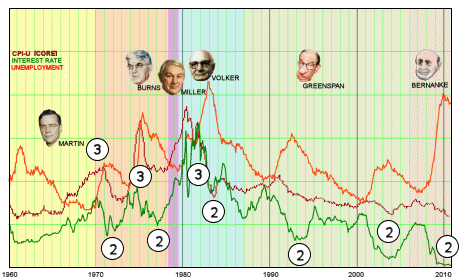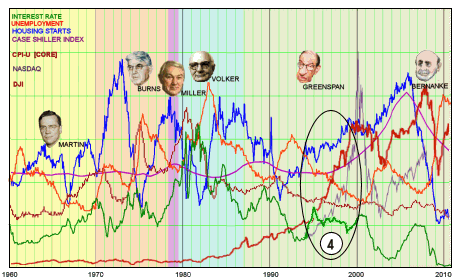After its big move to boost economy, Federal Reserve reflects on its history
Washington Post
By Neil Irwin
November 6, 2010JEKYLL ISLAND, GA. – The bankers who gathered on this island resort a century ago to plot out what would become the Federal Reserve System did so secretly, traveling under fake names to avoid attracting attention. The people who run the organization that those bankers dreamed up were rather less subtle this time around. As Fed Chairman Ben S. Bernanke and a long list of past and present Fed officials gathered this weekend for a conference on the history of the central bank, they were surrounded by security guards in black sport-utility vehicles and TV cameras broadcasting their conversation around the world.
That conversation, particularly a Saturday panel discussion featuring Bernanke, his predecessor, Alan Greenspan, and former New York Fed president Gerald Corrigan, offered a window into how the leaders of the Federal Reserve view their achievements and failures, and their role in a post-financial-crisis world. In particular, Bernanke painted some of the major decisions he has made both during the financial crisis and this past week as consistent with the Fed’s founding mission, hammered out on this island a century ago.
The central bank has had no shortage of trials and failures in its first hundred years – the Great Depression of the 1930s and the Great Inflation period of the 1970s most prominent among them. The challenge of the 2010s, it increasingly appears, will be dealing with the aftermath of the most recent financial panic and the Great Recession. The nation is still grappling with the economic devastation those events wrought, most evident in a 9.6 percent unemployment rate. Just last week, the Fed took unconventional steps to try to bring that rate down and to draw inflation up a bit from its rock-bottom levels, pledging to buy $600 billion of bonds to try to push down long-term interest rates. Speaking at the "Return to Jekyll Island" conference sponsored by the Atlanta Fed, Bernanke argued that the steps are not as revolutionary as many observers in the financial markets and the news media have suggested. "There’s a sense out there that, quote, quantitative easing or asset purchases are some completely foreign, new, strange kind of thing and we have no idea what . . . is going to happen," Bernanke said, sitting onstage in a conference space that was once J.P. Morgan’s indoor tennis court. "Quite the contrary – this is just monetary policy. . . . It will work or not work in much the same way that ordinary, more conventional, familiar monetary policy works." Corrigan, who was a key lieutenant of Fed Chairman Paul A. Volcker and is now a Goldman Sachs managing director, acknowledged some "uneasiness" with that approach. "If you seek to nudge up the inflation rate," he said, "even with very, very low rates of capacity utilization in the labor market . . . is there a risk that getting inflation to 2 percent may turn out to be easier than capping it at 2 percent?" "That’s the source of uneasiness that I wanted to register," Corrigan added. Bernanke defended the action. "I have rejected any notion that we are going to try to raise inflation to a super-normal level in order to have effects on the economy," he said. "We’re not in the business of trying to create inflation," Bernanke said. Rather, he said, the Fed is trying to avoid a further drop in inflation.
In recent decades, the major mission of the Fed has been to manage the money supply to try to stabilize the economy. But when the Fed was founded – the private discussions at Jekyll Island in 1910 were followed by congressional passage of the Federal Reserve Act of 1913 and the creation of the Fed in 1914 – its main mission was to prevent bank panics that had intermittently ravaged the U.S. economy from 1873 to 1907. In other words, the Fed was a lender of last resort to the banking system long before it was in charge of stabilizing the economy and inflation more generally. After all, when there was a gold standard, there was little ability to expand or contract the money supply.
Bernanke described the breakdown of several key financial markets during 2007 and 2008 – the short-term funding markets that investment banks used to finance their operations, for example – as a 21st-century version of those pre-1914 bank runs. Those complex securities had "the same structure as a bank, except they didn’t have the protections, the guarantees and the oversight that a bank has," Bernanke said. Referring to a series of unconventional Fed programs launched to pump money into various corners of the financial system, he added, "I really think of it as a classic lender-of-last-resort response, adapted for the complexity of the financial system."
To many Fed critics, a central failure over the past three decades has been the perceived willingness of the central bank to take action to prop up financial markets whenever they are faltering, a phenomenon known as the "Greenspan Put," which uses the term for an option that protects against an asset losing value. The criticism is that by standing in to prevent precipitous declines in financial markets, the Fed made it appear that one could invest without risk – and that this led investors to be overly complacent about risk, which in turn fueled the panic of 2007 to 2009. Given that his own policies have helped prop up stock prices in the past year, Bernanke echoed the phraseology of some of his critics and referred to the phenomenon, almost sheepishly, as the "Greenspan/Bernanke Put." Greenspan was unrepentant. "If in effect the Greenspan Put is the notion which says you’re stabilizing the system, then I hope so – that’s what we’re here for," the former Fed chairman said. "I don’t really have an understanding of why that has become a pejorative term… If I understand it, what we’re doing is what we should be doing."
 I am not a "Libertarian" and I don’t much like Ron Paul, but in this case, he has a point. He wants the Fed to go away and let the Markets just do whatever they want to do. What’s fascinating to me is that Ron Paul is an Ayn Rand devotee, just like Greenspan. He thinks the Markets will handle things unassisted [just like Greenspan]. Yet Ron Paul and Alan Greenspan are on opposite sides of the fence on this issue. To me, that says something about that whole philosophy. Both men preach a gospel of leave the Markets alone. Get the government out of things. Yet one represents the Federal Reserve overstepping its power. The other wants to divest it of power.
I am not a "Libertarian" and I don’t much like Ron Paul, but in this case, he has a point. He wants the Fed to go away and let the Markets just do whatever they want to do. What’s fascinating to me is that Ron Paul is an Ayn Rand devotee, just like Greenspan. He thinks the Markets will handle things unassisted [just like Greenspan]. Yet Ron Paul and Alan Greenspan are on opposite sides of the fence on this issue. To me, that says something about that whole philosophy. Both men preach a gospel of leave the Markets alone. Get the government out of things. Yet one represents the Federal Reserve overstepping its power. The other wants to divest it of power. 


So as odious as Ron Paul’s government free America seems, his planned probing of the role of the Federal Reserve in our economy is probably a good idea. Greenspan claimed to be a free-market guy, but he turned out to be a market manipulator who had a big role in our contemporary problems, maybe "the decider."
If you read books like Irrational Exuberance by Robert Shiller or The return of depression economics and the crisis of 2008 by Paul Krugman, it all seems to make some kind of sense – except people didn’t see it coming. Shiller sort of saw it, at least he saw the "housing bubble" growing. Greenspan admitted to the possibility of "irrational exuberance" in 1996, but the train kept running. If you Google Greenspan’s many speeches or other economists speaking, what they saw and wondered about was the amazing performance of the Stock Market. And when they talked about it, there was much speculation that now sounds odd – the "New Economy" that had different rules was a much bantered about metaphor. And as Unemployment fell, Inflation didn’t rise as expected. That was Greenspan’s justification for leaving Interest Rates low – a fatal flaw.
Sorry, the comment form is closed at this time.